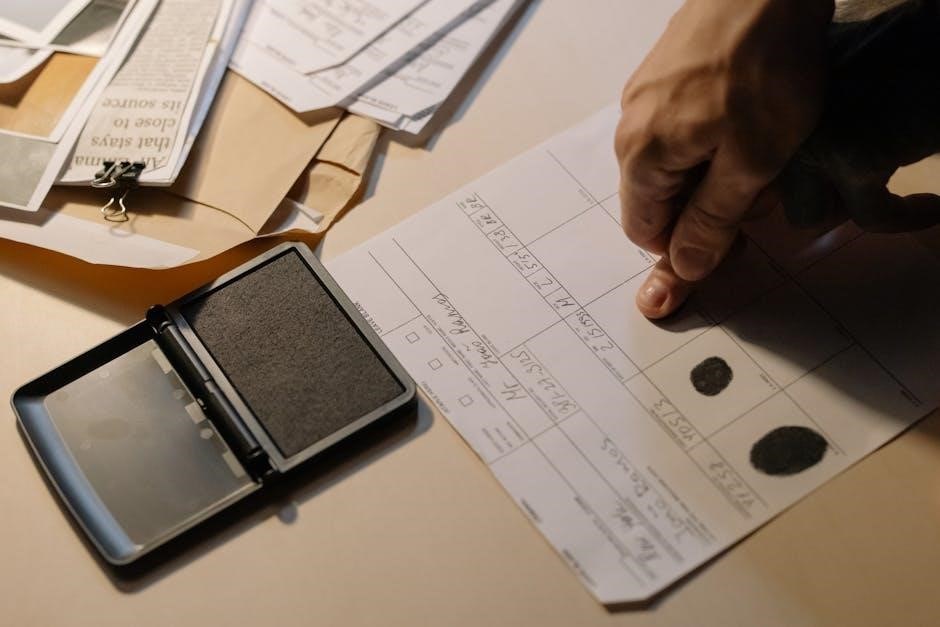New Jersey probate procedures involve the legal validation of wills, assessment of estate taxes, and distribution of assets to rightful heirs or beneficiaries, ensuring fairness and compliance with state laws.
1.1 Purpose and Overview of Probate
Probate is the legal process that validates a deceased person’s will, ensuring their wishes are carried out. It involves appointing an executor, inventorying assets, paying debts, and distributing remaining assets to beneficiaries. Probate ensures legal compliance and fairness, protecting the rights of all parties involved while resolving disputes. It also assesses and pays estate taxes, guaranteeing lawful distribution of the estate. This process is essential for transferring ownership of property and fulfilling the deceased’s intentions, providing a structured framework for heirs and executors to follow.
1.2 Key Concepts and Definitions
In New Jersey probate, key concepts include the will, a legal document outlining asset distribution, and the executor, responsible for managing the estate. Probate itself is the legal validation of the will. Estate assets encompass all property, both real and personal, owned by the deceased. Beneficiaries are individuals or entities entitled to receive assets. Fiduciary duty requires the executor to act in the best interests of beneficiaries. Understanding these terms is crucial for navigating the probate process effectively, ensuring compliance with legal requirements and facilitating smooth asset distribution.

Executor’s Responsibilities in Probate
The executor must manage estate assets, communicate with beneficiaries, and fulfill fiduciary duties, ensuring all actions align with the deceased’s wishes and legal requirements.
2.1 Fiduciary Duty and Executor’s Role
The executor holds a fiduciary duty to act in the best interests of the estate and its beneficiaries, managing assets responsibly and fulfilling legal obligations. This role requires transparency, fairness, and adherence to the deceased’s wishes as outlined in the will. Executors must avoid conflicts of interest and ensure all actions align with the estate’s best interests. They are responsible for settling debts, distributing assets, and maintaining open communication with beneficiaries. Failure to uphold this duty can lead to legal consequences, emphasizing the importance of integrity and diligence in executing their responsibilities effectively and ethically.
2.2 Managing Estate Assets and Beneficiary Communication
Managing estate assets requires meticulous care to preserve their value and ensure proper distribution. Executors must inventory, appraise, and safeguard all assets, while keeping detailed records. Effective communication with beneficiaries is crucial to maintain trust and transparency. Executors should provide regular updates on the estate’s status, address concerns promptly, and be prepared to share financial reports. Open dialogue helps prevent disputes and ensures smooth probate proceedings. Beneficiaries have the right to be informed about asset management and distribution timelines. Clear and consistent communication fosters cooperation and aligns expectations, which is essential for fulfilling the executor’s fiduciary responsibilities effectively.

The Probate Process in New Jersey
The probate process in New Jersey involves legally validating the will, assessing estate taxes, and ensuring proper distribution of assets to rightful heirs or beneficiaries.
3.1 Filing the Will and Required Documents
The first step in New Jersey probate is filing the deceased person’s will and required documents with the Surrogate’s Court in the county where the deceased resided. The executor must submit the original will, a certified death certificate, and an inventory of estate assets. Additional documents may include tax returns or appraisals, depending on the estate’s complexity. The process ensures the will is legally validated and the estate is properly managed. Filing the will initiates the probate process, allowing the executor to act on behalf of the estate and carry out the deceased’s wishes as stated in the will. Timely filing is essential to avoid delays.
3.2 Assessing and Paying Estate Taxes
During New Jersey probate, the executor must assess and pay any applicable estate taxes. This involves calculating the estate’s value and determining if federal or state taxes apply. New Jersey does not impose its own estate tax, but federal estate taxes may be required for larger estates. The executor files the necessary tax returns and ensures payments are made to avoid penalties. Once taxes are settled, the remaining assets are distributed to beneficiaries as per the will. Proper documentation and adherence to tax deadlines are crucial to maintain compliance and finalize the estate’s financial obligations effectively.
3.4 Ensuring Rightful Heir Distribution
Ensuring rightful heir distribution is a critical step in New Jersey probate, where the executor verifies the identity of heirs and adheres to the deceased’s wishes as outlined in the will. This process involves inventorying the estate’s assets and distributing them according to the will’s instructions or state intestacy laws if no will exists. The executor must communicate with all beneficiaries and ensure transparency in the distribution process. If disputes arise, they are typically resolved through mediation or court intervention. The goal is to ensure that each heir receives their rightful share, maintaining fairness and compliance with legal requirements throughout the process.

Legal Requirements and Documentation
New Jersey probate requires specific legal documents, including the will, death certificate, and inventory of assets, to ensure compliance with state laws and facilitate a smooth process.
4.1 The Role of the Personal Property Memorandum
A Personal Property Memorandum is a document that allows individuals to detail the distribution of personal items, such as family heirlooms or sentimental objects, outside of the will. It provides flexibility and specificity in allocating tangible personal property, which can be particularly useful for items of emotional or cultural significance. This memorandum must be referenced in the will to ensure its validity. It simplifies the probate process by clarifying the deceased’s wishes regarding personal belongings, reducing potential conflicts among beneficiaries. Executors can use this document to ensure that the deceased’s intentions are honored, aligning with New Jersey’s legal requirements for estate administration.
4.2 Validating the Deceased’s Wishes
Validating the deceased’s wishes is a critical step in New Jersey probate procedures, ensuring that the estate is managed and distributed according to the individual’s intentions. This process involves verifying the authenticity of the will and any accompanying documents, such as a personal property memorandum. The probate court plays a central role in this validation, ensuring that the will is legally sound and free from fraud or undue influence. Beneficiaries and executors must adhere to the deceased’s directives, with the court overseeing the process to prevent disputes. Proper documentation and adherence to legal standards are essential to honor the deceased’s wishes and maintain fairness throughout the probate process.
Due Process and Legal Protections
The Due Process Clause ensures fair procedures in probate, protecting individuals from arbitrary actions and safeguarding their rights to property and legal representation in estate matters.
5.1 The Due Process Clause and Probate
The Due Process Clause guarantees fairness in probate proceedings, ensuring that individuals are not deprived of property without lawful procedures. It mandates that all parties, including beneficiaries and executors, receive adequate notice and the opportunity to be heard. This constitutional safeguard prevents arbitrary decisions, ensuring transparency and equity throughout the probate process. In New Jersey, courts adhere strictly to due process principles, protecting the rights of all involved and maintaining the integrity of estate administration. This legal framework is essential to uphold justice and prevent disputes during the distribution of the deceased’s assets.
5.2 Protecting Beneficiary Rights
Protecting beneficiary rights is a cornerstone of New Jersey probate procedures. Beneficiaries are entitled to clear communication from executors regarding estate management and distribution. They have the right to request detailed accountings of the estate’s assets, expenses, and distributions. If an executor fails to fulfill their fiduciary duties, beneficiaries can petition the court for relief, including the removal of the executor. Additionally, beneficiaries are protected from unfair or unequal distributions, as the law ensures adherence to the deceased’s wishes as outlined in the will. Legal safeguards also prevent heirs from being unjustly excluded or disadvantaged during probate, ensuring equitable treatment for all rightful beneficiaries.

Common Issues in Probate
Common issues in probate include executor-beneficiary conflicts, eviction concerns, delays in asset distribution, tax disputes, and legal challenges, requiring careful navigation to ensure a smooth process.
6.1 Executor-Beneficiary Conflicts
Executor-beneficiary conflicts often arise during probate due to disagreements over asset distribution, management decisions, or communication breakdowns. Executors, bound by fiduciary duty, must act in beneficiaries’ best interests, but tensions may escalate if beneficiaries feel excluded or misinformed. Common issues include delays in distributing assets, disputes over executor fees, or allegations of mismanagement. Beneficiaries may seek legal action if they believe the executor is not fulfilling their obligations fairly. Open communication and transparency are crucial to minimizing conflicts. If unresolved, court intervention may be necessary to ensure the estate is administered according to the deceased’s wishes and legal standards. Addressing these issues promptly helps maintain harmony and ensures a smooth probate process.
6.2 Eviction Concerns During Probate
Eviction concerns often arise during probate, particularly for individuals residing in the deceased’s property. Family members or caregivers living in the estate may worry about being evicted by the executor or other beneficiaries. However, New Jersey law provides protections for certain occupants, such as spouses, minors, or disabled individuals. Executors generally cannot evict someone without legal justification or court approval. If eviction is attempted, the court may intervene to ensure the process follows due process. It is important for all parties to seek legal advice to understand their rights and obligations during probate. Open communication and legal guidance can help resolve such disputes fairly and efficiently.
Estate Planning and Probate
Estate planning streamlines probate by ensuring assets are distributed according to the deceased’s wishes, minimizing conflicts and legal complexities for beneficiaries and executors alike.
7.1 Do You Need a Lawyer for Estate Planning?
While not legally required, hiring an estate planning attorney is highly recommended to ensure your will, trusts, and other documents comply with New Jersey laws, avoiding future disputes and ensuring your wishes are carried out accurately. An attorney can provide tailored advice, address complex situations, and guide you through the legal nuances of estate planning, making the process smoother and more secure for you and your beneficiaries.
7.2 Updating Your Estate Plan
Regularly updating your estate plan is crucial to reflect life changes, such as births, marriages, or asset acquisitions, ensuring your wishes remain relevant and legally binding. New Jersey laws may evolve, requiring adjustments to maintain compliance. Even if your circumstances seem unchanged, reviewing your will, trusts, and beneficiary designations every few years helps prevent potential disputes. It’s essential to consult an estate planning attorney to ensure updates align with legal requirements and your personal goals. This proactive approach safeguards your legacy and provides peace of mind, knowing your estate plan remains effective and aligned with the Due Process Clause protections.

